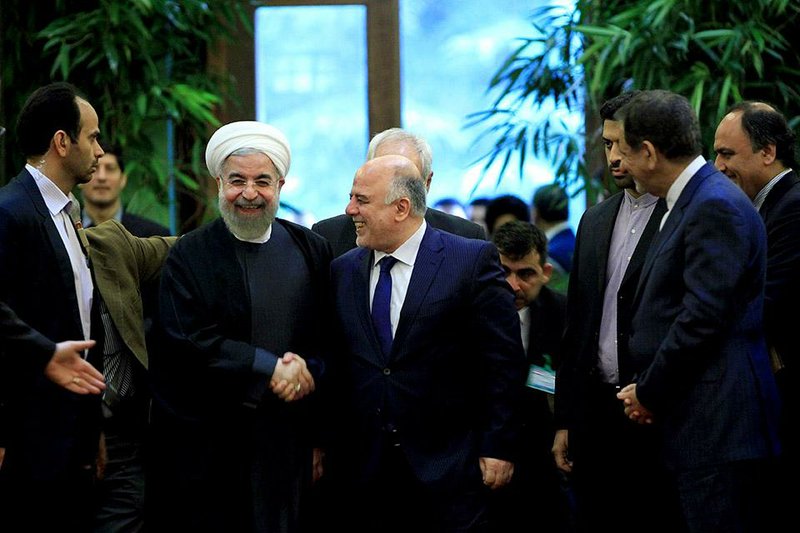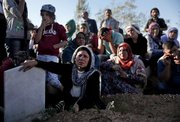TEHRAN, Iran -- Shiite powerhouse Iran has pledged enduring support for the Shiite-led government of Iraq in its battle against an ascendant Sunni insurgency spearheaded by the Islamic State extremist group.
Iranian President Hassan Rouhani told visiting Iraqi Prime Minister Haider al-Abadi on Tuesday that Tehran has supported Baghdad "from the first day and will remain on that path until the last day," according to a report by the official IRNA news agency.
Later, the state news agency reported that Iran's Supreme Leader Ayatollah Ali Khamenei, who has final say on all state matters, told al-Abadi that he considered the security of Iraq and Iran "inseparable."
It was al-Abadi's first foreign visit since taking office in September.
"Choosing Iran as my first destination after taking office indicates the depth of ties," he said, according to IRNA. "Terrorism is a threat to all regional countries, and we are sure Iran will stand by us."
The Iran-Iraq alliance highlights some of the complex political dynamics spawned by the emergence of the Islamic State as a major threat this year. The radical Sunni militia has captured and held large swaths of territory in eastern Syria and northwestern Iraq, including the major northern Iraqi city of Mosul, and threatens to expand southward toward Baghdad.
Iran and the United States are essentially on the same side in backing Baghdad and opposing the Islamic State, though neither country acknowledges any sort of direct coordination. Meanwhile, Iran continues to support Syrian President Bashar Assad, whom Washington opposes.
Rouhani, in his Tuesday comments, said greater regional cooperation among affected countries was the only solution to confronting the Islamic State.
Inside Iraq, a string of bombings in and near Baghdad killed 33 people. Police officials said the deadliest attack took place Tuesday afternoon when a double car-bomb attack hit Habaybina restaurant in the Shiite-majority district of Talibiya in eastern Baghdad, killing 19 people and wounding 32 others.
Earlier, a bomb detonated at an outdoor market in the southern district of Abu Dashir, a mostly Shiite neighborhood, killing four people and wounding nine, police officials said.
Later, a bomb that went off near a small restaurant in central Baghdad killed five people and wounded 12, the officials said. Another bomb exploded at a commercial street in the town of Madian, just south of Baghdad, killing two people and wounding four.
Also, police said a roadside bomb explosion missed a police patrol in eastern Baghdad, killing three civilians and wounding two.
Medical officials confirmed the casualty figures. All officials spoke on condition of anonymity because they were not authorized to talk to the media.
No one immediately claimed responsibility for the latest attacks.
Also Tuesday, Ivan Simonovic, the United Nations assistant secretary-general for human rights, said evidence strongly indicates that the Islamic State's assault on Iraq's Yazidi religious minority group is "an attempt to commit genocide."
Hundreds of Yazidis were killed as the Islamic State swept across parts of northern and western Iraq in August. Tens of thousands fled for their lives, most to the Kurdish-held parts of northern Iraq. Hundreds of women and girls were captured by fighters.
An estimated 7,000 Yazidis stayed and have been forced to convert to the Islamic State's harsh interpretation of Islam.
In Syria on Tuesday, Islamic State fighters seized at least one cache of weapons airdropped by U.S.-led coalition forces that were meant to supply Kurdish militiamen battling the extremist group in a border town, activists said Tuesday.
The cache of weapons included hand grenades, ammunition and rocket-propelled grenade launchers, according to a video uploaded by a media group loyal to the Islamic State.
State Department deputy spokesman Marie Harf said the U.S. had seen the video but couldn't confirm its accuracy and was seeking more information.
The Britain-based Syrian Observatory for Human Rights, which bases its information on a network of activists on the ground, said the militants had seized at least one cache.
The caches were airdropped early Monday to Kurds in the Syrian city of Kobani, which lies near the Turkish border. The militant group has been trying to seize the city for more than a month now, causing the exodus of some 200,000 people from the area into Turkey. While Kurds are battling on the ground, a U.S.-led coalition is also targeting the militants from the air.
The militants already possess U.S. weapons worth millions of dollars that they captured from fleeing Iraqi soldiers when the group seized swaths of Iraq in a sudden sweep in June.
On Tuesday, the U.S. Central Command said U.S. military forces conducted four airstrikes near Kobani that destroyed Islamic State fighting positions, a militant-controlled building and a large militant unit.
Information for this article was contributed by Murtada Faraj, Qassim Abdul-Zahra, Diaa Hadid and Cara Anna of The Associated Press.
A Section on 10/22/2014




